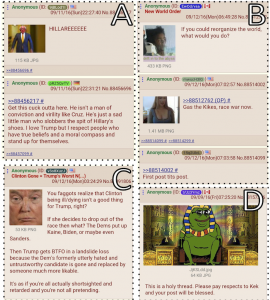The discussion board site 4chan has been a part of the Internet’s dark underbelly since its creation, in 2003, by ‘moot’ (Christopher Poole). But recent events have brought it under the spotlight, making it a central figure in the outlandish 2016 US election campaign, with its links to the “alt-right” movement and its rhetoric of hate and racism. However, although 4chan is increasingly “covered” by the mainstream media, we know little about how it actually operates and how instrumental it is in spreading hate on other social platforms. A new study, with colleagues at UCL, Telefonica, and University of Rome now sheds light on 4chan and in particular, on /pol/, the “politically incorrect” board.
What is 4chan anyway?
4chan is an imageboard site, built around a typical bulletin-board model. An “original poster” creates a new thread by making a post, with one single image attached, to a board with a particular focus of interest. Other users can reply, with or without images. Some of 4chan’s most important aspects are anonymity (there is no identity associated with posts) and ephemerality (inactive threads are routinely deleted).
4chan currently features 69 boards, split into 7 high level categories, e.g. Japanese Culture or Adult. In our study, we focused on the /pol/ board, whose declared intended purpose is “discussion of news, world events, political issues, and other related topics”. Arguably, there are two main characteristics of /pol/ threads. One is its racist connotation, with the not-so-unusual aggressive tone, offensive and derogatory language, and links to the “alt-right” movement—a segment of right-wing ideologies supporting Donald Trump and rejecting mainstream conservatism as well as immigration, multiculturalism, and political correctness. The other characteristic is the fact that it generates a substantial amount of original content and “online” culture, ranging from the “lolcats” memes to “pepe the frog.”
This figure below shows four examples of typical /pol/ threads:

Raids towards other services
Another aspect of /pol/ is its reputation for coordinating and organizing so-called “raids” on other social media platforms. Raids are somewhat similar to Distributed Denial of Service (DDoS) attacks, except that rather than aiming to interrupt the service at a network level, they attempt to disrupt the community by actively harassing users and/or taking over the conversation.
